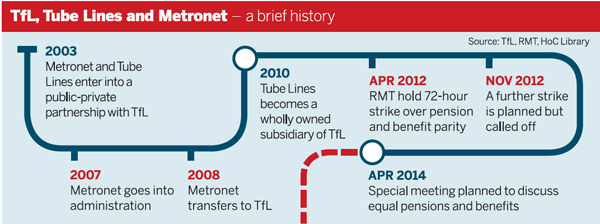Transport union RMT has reignited calls for all Transport for London employees undertaking work on a contract basis to be allowed to join its defined benefit pension fund.
It is the latest employer to see past decisions come under scrutiny, with the High Court ruling earlier this month that IBM’s closure of its DB scheme had breached its duty of good faith.
 An extraordinary general meeting of TfL fund members has been called to discuss proposals to allow all employees of TfL and London Underground – particularly those previously employed by Tube Lines and Metronet – to join.
An extraordinary general meeting of TfL fund members has been called to discuss proposals to allow all employees of TfL and London Underground – particularly those previously employed by Tube Lines and Metronet – to join.
In 2003, TfL entered a public-private partnership with Tube Lines, which provides track maintenance for the underground.
Tube Lines then gave its workers protection to guarantee their membership of TfL’s DB scheme. However, it closed its section of the TfL scheme to new members and set up a defined contribution plan for employees hired after 2003.
In 2010, it became a wholly owned subsidiary of TfL. The RMT now argues all contract workers should be given parity.
“In our view Tube Lines is now coming under the umbrella of TfL,” said Paul Norris, pensions officer at the union. “Just because they haven’t got TfL written on their overalls, doesn’t mean they’re not employed by TfL.”
A spokesperson for TfL said its scheme is open to new members provided they are on a TfL employment contract.
“Although Tube Lines is a wholly owned subsidiary of TfL, it does have its own management structure and own pension arrangement,” the spokesperson said. “So decisions on which pension arrangement [employees enter] is a matter for the employer.”
There are no real grounds to say a new employee has to be given the same benefits as an old employee, said Matthew Swynnerton, partner at law firm DLA Piper.
Yet there could be grounds for complaint if the scheme’s existing provisions give new starters an automatic right to join, he added.
“If the membership of the scheme wasn’t at invitation of the trustee, the rules would have to be amended to make it discretionary,” he said.
RMT is also backing calls for former employees of Metronet, who did not join the TfL scheme when first given the opportunity, to be admitted.
Metronet entered into a public-private partnership with TfL in 2003, but went into administration in July 2007, and employees of Metronet were given the opportunity to join the TfL scheme.
Around 100 employees did not join the scheme at the time, according to the RMT.
It would just depend what has been put in employees’ contract by Tube Lines as to whether they would have the right to join the scheme, said Anne-Marie Winton, partner at law firm Nabarro.
RMT is also backing calls for former employees of Metronet that did not join the TfL scheme when first given the opportunity to be admitted.
Metronet entered into public-private partnership with TfL in 2003, but went into administration in July 2007, and employees of Metronet were given the opportunity to join the TfL scheme.
Around 100 employees did not join the scheme at the time, according to the RMT, which argues these employees should now be allowed to join the scheme.
However, even if it was a bad decision by the employee, that doesn’t mean there was any breach of employer or trustee duty, said Winton.
“The only problem the employer would have is if they were being immensely secretive,” she said.

























